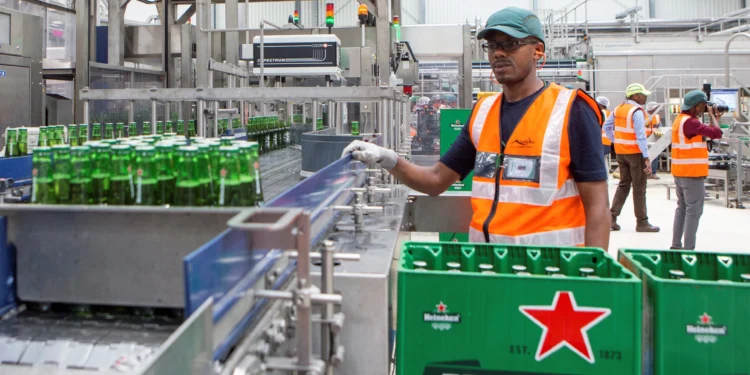Heineken NV’s Nigerian unit temporarily shut two factories in the West African nation and this is caused by the depreciation of the currency that increased costs and impaired the purchasing power of consumers.
The company said the move is essential to improve its operational efficiency, and financial stability and enable a return of the business to profitability, in the face of the persistently challenging business environment. It added that the measure aims at securing a resilient and sustainable future for its stakeholders.
In letters signed by the company’s Human Resource Director, Grace Omo-Lamai, and addressed to the leadership of the National Union of Food, Beverage & Tobacco Employees (NUFBTE) and the Food Beverage and Tobacco Senior Staff Association (FOBTOB), the company informed both unions that its proposed plan would include operational efficiency measures and a company-wide reorganization that includes the temporary suspension of operations in two of its nine breweries.
As a result, and by labor requirements, the Company invited the Unions to discussions on the implications of the proposed measures.
However, this is coming after the company recently notified the Nigerian Exchange Group (NGX) of its plan to raise capital of up to ₦600 billion (Six Hundred billion naira) by way of a Rights Issue, as a means of restoring the company’s balance sheet to a healthy position following the net finance expenses of N189 billion recorded in 2023 driven mainly by a foreign exchange loss of N153 billion resulting from the devaluation of the naira.
What The Managing Director/CEO Of Nigerian Breweries Has To Say
Speaking on these developments, Managing Director/CEO of Nigerian Breweries Plc, Hans Essaadi described the business recovery plan as strategic and vital for business continuity:
He also said that “Nigerian Breweries Plc has nine plants in the country and is “providing strong support and severance packages to all affected,” the company said in a filing. The move will help the company reverse a 15% capacity expansion over the past decade and reduce costs”.
“We recognize and regret the impact that the suspension of brewery operations in the two affected locations may have on our employees. We are committed to limiting the impact on our people as much as possible by exhausting all options available including the relocation and redistribution of employees to our other seven breweries, and providing strong support and severance packages to all those that become unavoidably affected. We are also committed to supporting our host communities in ways that ensure they continue to feel our presence. “he added
Nigeria Breweries Recovery Plan
The Nigerian Breweries’ business recovery plan includes a Rights Issue and a company-wide reorganization exercise which includes the temporary suspension of two out of its nine breweries in the country and an optimization of production capacity in the other seven breweries, some of which have received significant capital investment in recent years.
READ MORE: Dr Arikana, Enabulele, Others Team Up For Ubuntu Awakening Summit
The company reaffirmed its commitment to the long-term future of Nigeria and “stands as a cornerstone of Nigeria’s beverage industry.”With over 77 years of operations, the company said it would continue to demonstrate its enduring commitment to the Nigerian market and its people.
Incorporated in 1946 as “Nigerian Brewery Limited,” NB Plc made history in June 1949 when the first bottle of STAR lager beer rolled out of its Lagos brewery bottling line.
Today, it has a rich portfolio of 21 high-quality brands, including iconic brands like Heineken, Desperados, Maltina, Life, Amstel Malta, Gulder, Fayrouz, and Legend produced from nine breweries and distributed nationwide.
More,,,,
The maker of Star Lager and Legend Extra Stout is joining multinational companies including Procter & Gamble Co., GSK Plc, and Bayer AG that have been forced to either revamp their business or exit the country. The naira’s weakness and the resulting surge in prices have severely eroded the ability of Nigerians to buy consumer goods.
Nigerian Breweries, which in February said that it was facing its worst downturn in history, is reorganizing its operations after running into a loss of 106 billion naira ($94 million) in 2023.
The loss is due to “a combination of challenging economic factors ranging from heightened operational costs, continued pressure on consumer disposable income, escalating inflation rates, FX volatility, among others,” the company said.
The closure of the two breweries is part of a business recovery plan intended to return the company to profitability, Essaadi said.
The brewer has announced plans to raise 600 billion naira in fresh capital from existing shareholders to settle foreign-currency-denominated obligations. This was after a foreign exchange loss of 153 billion naira eroded shareholder’s equity.
Nigeria’s naira lost at least 70% of its value from June until mid-March when it started retracing its losses, appreciating 40% since then to become the world’s best-performing currency.
Still, the naira is at least 50% weaker than a year earlier and this has resulted in a jump in the local currency equivalent of the dollar liabilities of some of the nation’s biggest firms, plunging them into losses that eroded their capital.










